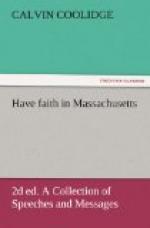this! Our distress was so great that we should
have been glad to snatch at anything that looked like
a government.... Now, Mr. President, when I saw
this Constitution, I found that it was a cure for
these disorders. I got a copy of it, and read
it over and over.... I did not go to any lawyer,
to ask his opinion; we have no lawyer in our town,
and we do well enough without. My honourable old
daddy there (pointing to Mr. Singletary) won’t
think that I expect to be a Congressman, and swallow
up the liberties of the people. I never had any
post, nor do I want one. But I don’t think
the worse of the Constitution because lawyers, and
men of learning, and moneyed men are fond of it.
I am not of such a jealous make. They that are
honest men themselves are not apt to suspect other
people.... Brother farmers, let us suppose a
case, now. Suppose you had a farm of 50 acres,
and your title was disputed, and there was a farm
of 5000 acres joined to you that belonged to a man
of learning, and his title was involved in the same
difficulty; would you not be glad to have him for
your friend, rather than to stand alone in the dispute?
Well, the case is the same. These lawyers, these
moneyed men, these men of learning, are all embarked
in the same cause with us, and we must all sink or
swim together. Shall we throw the Constitution
overboard because it does not please us all alike?
Suppose two or three of you had been at the pains
to break up a piece of rough land and sow it with
wheat: would you let it lie waste because you
could not agree what sort of a fence to make?
Would it not be better to put up a fence that did
not please every one’s fancy, rather than keep
disputing about it until the wild beasts came in and
devoured the crop? Some gentlemen say, Don’t
be in a hurry; take time to consider. I say,
There is a time to sow and a time to reap. We
sowed our seed when we sent men to the Federal Convention,
now is the time to reap the fruit of our labour; and
if we do not do it now, I am afraid we shall never
have another opportunity.”
There spoke the common sense of the common man of
the Commonwealth. The counsel of the farmer from
the country, joined with the resolutions of the workingmen
from the city, carried the convention and the Constitution
was ratified. In the light of succeeding history,
who shall say, that it was not the voice of the people,
speaking with the voice of Infinite Authority?
The attitude of Samuel Adams, William Shepard, Jonathan
Smith and the workingmen of Boston toward government,
is worthy of our constant emulation. They had
not hesitated to take up arms against tyranny in the
Revolution, but having established a government of
the people they were equally determined to defend
and support it. They hated the usurper whether
king, or Parliament, or mob, but they bowed before
the duly constituted authority of the people.




